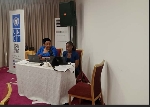Nigeria, Ghana strengthen customs cooperation to boost trade and combat illicit activity
 Ghanaian officials and Nigerian custom officials engaging during the countetpart's visit to Ghana
Ghanaian officials and Nigerian custom officials engaging during the countetpart's visit to Ghana
Nigeria and Ghana have renewed their commitment to deepen customs cooperation in a move aimed at reshaping West Africa’s trade and security landscape.
The Nigeria Customs Service (NCS) and the Customs Division of the Ghana Revenue Authority (GRA) have pledged stronger collaboration to curb illicit trade, protect national revenues, and advance the goals of the African Continental Free Trade Area (AfCFTA).
The renewed partnership underscores a shared resolve to confront increasingly sophisticated criminal networks exploiting gaps in border management across the sub-region.
Momentum for the new cooperation followed a high-level working visit to Accra by the Comptroller-General of the Nigeria Customs Service, Bashir Adewale Adeniyi, on November 3, 2025.
In a meeting with Brigadier-General Glover Annan, Commissioner-General of Ghana’s Customs Division, both leaders stressed the urgency of enhancing operational coordination.
Adeniyi warned that Africa’s customs systems must overcome decades of fragmentation, noting that limited harmonisation, weak intelligence sharing, and inconsistent enforcement have repeatedly allowed smugglers to thrive.
Ghanaian authorities expressed strong support for the renewed cooperation, commending the reforms the NCS has undertaken in automation, modern enforcement tools, and accountability.
Brig-Gen Annan said Ghana is ready to align with and learn from these improvements, signalling a shift toward collaboration rather than competition in regional customs operations.
Both sides acknowledged that although a Memorandum of Understanding on customs cooperation has been in place since 2001, rapidly changing trade patterns and emerging threats require an updated and more comprehensive framework.
They emphasised the need to revise the MoU to reflect technological advancements, current border realities, and modern enforcement standards.
A refreshed agreement, they said, would help streamline cargo movement, eliminate duplication, and strengthen efforts to tackle cross-border criminal activity.
A major priority identified during the engagement was intelligence sharing.
With smuggling networks becoming more organised and transnational, the two countries pledged to boost intelligence integration to enable real-time information exchange and coordinated enforcement.
This enhanced cooperation is expected to close security gaps along key trade corridors and safeguard revenues currently lost to illicit trade.
The discussions also highlighted the importance of regional integration under the AfCFTA.
With the AfCFTA Secretariat headquartered in Accra, the two countries recognised their responsibility to ensure that West Africa’s customs systems support the continent’s free-trade agenda.
Strengthened cooperation between Nigeria and Ghana is expected to reduce trade barriers, simplify clearance procedures, and facilitate a smoother movement of goods—boosting intra-African trade and enhancing the region’s competitiveness.
The renewed partnership complements broader continental initiatives such as the Customs–Partnership for African Cooperation in Trade (C-PACT), supported by Afreximbank and the World Customs Organisation, which seeks to strengthen transparency, modernisation and enforcement collaboration among African customs agencies.
Officials expect the Nigeria–Ghana partnership to serve as a model for other African countries working to balance trade facilitation with border security.
As West Africa confronts the escalating threats posed by illicit trade, the strengthened alliance between the NCS and GRA marks a significant step toward securing borders, protecting revenue and improving trade efficiency.
With both administrations committed to modernisation, harmonisation and enhanced intelligence-sharing, traders and businesses can anticipate faster and more predictable cross-border processes—laying the foundation for a more integrated and resilient regional trade environment.
Source: Classfmonline.com/Cecil Mensah
Trending Business

Ato Forson uncovers GHS13bn in dubious payment claims after ordering sweeping audit
06:21
Finance Minister presenting 2026 budget to Parliament
19:22
African Trade Chamber, West African Bankers’ Association sign landmark deal to boost regional trade
15:24
Acting MD of ICOUR sets 3Rs strategies to transform “tarnished” company image, boost food security
14:01
UNDP reaffirms commitment to Ghana's Actuarial Science and Financial Resilience at industry conference underway in Accra
11:16
2026 budget to scrap COVID-19 levy, no new taxes, military retooling, fiscal discipline to take centre-stage
07:58
Nigeria, Ghana strengthen customs cooperation to boost trade and combat illicit activity
01:16
Former Bogoso-Prestea Mine workers demand replacement of HGL with financially capable operator
11:21
NEIP CEO visits Zongo Business Incubator, applauds progress under 'Adwumawura' programme
11:12
Gov't engages Springfield on potential takeover of WCTP2 block to safeguard national petroleum assets
09:51



